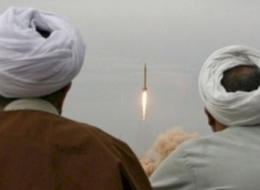UPDATES
The Trump Administration and Iran’s missile tests
February 10, 2017

Update from AIJAC
Update 02/17 #03
This Update deals with Iran’s test of a ballistic missile last week (actually, there were also reports of an alleged nuclear-capable cruise missile test which received less attention), the Trump Administration’s response including some new sanctions, and the implications of both for the Trump Administration’s overall Iran policy.
We lead with an attempt from former International Atomic Energy Agency Deputy Director-General Olli Heinonen to contextualise this test or tests. He notes that missile development is an integral part of a nuclear weapons program, and that the Iranian argument that UN Security Council Resolution 2231, which implemented the 2015 nuclear deal, allows missile development because its language only says Iran is “called on” not to test missiles, must not be allowed to go unanswered. He says the international community must either clarify that such development is definitely forbidden or pass a new resolution explicitly banning it – or else Iran will have delivery vehicles fully ready when the deal allows it to resume its nuclear enrichment in a decade. For Heinonen’s argument about what needs to be done in the wake of this test, CLICK HERE.
Next we feature a piece quoting two Israeli experts on the US Administration’s response to the Iranian test, academic specialist Dr. Emily Landau and leading security analyst Gen. (ret.) Yaakov Amidror. Both agree that the Trump Administration’s response to what Landau describes as a deliberate provocation and test of the US by Iran looks promising. Landau stresses that it is important not to let other criticisms of Trump conceal when the Administration gets it right, while Amidror stresses that the improvement comes because the previous Administration was fearful that any criticism of Iran would cause Iran to walk away from the nuclear deal. For both their views in more detail, CLICK HERE. A further Israeli academic’s view of the Trump Administration response comes from Eyal Zisser. Meanwhile, another academic, Ephraim Kam, argues that one positive sign is that the Trump Administration has returned to warning Iran that “all options are on the table”, language that the Obama Administration initially used, but then discarded after the nuclear deal neared completion.
Finally, American columnist Ben Cohen argues that the provocative Iranian test was to some extent an opportunity – reminding the world, pre-occupied with other crises, of the seriousness of the ongoing Iranian nuclear problem. He notes that the Trump Administration response was heartening because it took notice of the test as a display of Iran’s intentions, while the Obama Administration would likely have played down the issue to protect the nuclear deal. Cohen argues that Iranians should be sitting up and taking notice that the rose-tinted spectacles in Washington are very much off, and that Congress as well as the Administration is making it clear that the US is not prepared to allow Iran to follow the North Korea path and negotiate, delay and cheat its way to nuclear status. For his complete argument, CLICK HERE.
|
|
|
|
|
|
|
Tags: International Security, Iran








